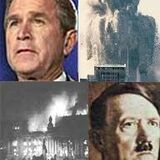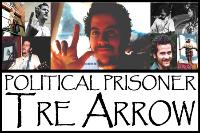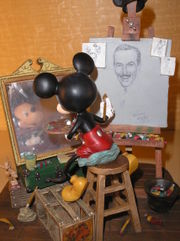Saturday, November 24
November 2006 Redux: Austrailan Power Elite Switches Out "Conseratives" with "Liberals"
 [T]he two parties should be almost identical, so that the American [and Australian] people can “throw the rascals out” at any election without leading to any profound or extensive shifts in policy. --Georgetown University historian and U.S. State Department consultant Carroll Quigley, in his 1966 book Tragedy and Hope: A History of the World in Our Time, on the U.S.power elite's manipulation of America's pseudo-two party system in forwarding its globalist agenda
[T]he two parties should be almost identical, so that the American [and Australian] people can “throw the rascals out” at any election without leading to any profound or extensive shifts in policy. --Georgetown University historian and U.S. State Department consultant Carroll Quigley, in his 1966 book Tragedy and Hope: A History of the World in Our Time, on the U.S.power elite's manipulation of America's pseudo-two party system in forwarding its globalist agendaIn 2003, Australian John Howard was among George W. Bush's first bribed and coerced politicians (13-page report here) to commit his countrymen to the U.S.'s 49-nation "coalition of the willing" (1), a public relations ploy giving the theft of Iraqi oil a scintilla of international respectability--of appearing more than yet another resource theft military campaign coordinated through a business- congenial White House.
But yesterday Australian voters swept from power the pro-Bush Howard and his conservative party in favor of leftward tilting political management, "only the seventh time voters have ousted their government since the beginning of World War II."
But a closer reading of a Bloomberg news service story indicates something else is on the up and up in the land down under. One must think so, if labor-bashing George Bush agreed to meet with Howard's labor-friendly opponent just days before the elections.
Indeed, the evidence suggests Australia's power elite (with U.S. approval?) cast out Howard for Kevin Rudd, a polished Labor Party politico well versed in Asian culture and economics.
Still, the Australian media report Rudd won, in part, for a promise
to pull Australian troops out of Iraq. Some 64 percent of voters opposed the nation's 1,600 soldiers serving in Iraq, according to a Newspoll survey on Oct. 3. Rudd will keep the 900 personnel in Afghanistan.But Australia's banking community pulled the plug on Howard during "an election campaign dominated by debate on interest rates and promises of big income tax cuts."
Howard's bid for a fifth term faltered when his claim to be a better economic manager than Rudd--one of the central planks of his campaign--was undermined by the first interest rate increase during an election campaign. [emphasis added]Ladies and gents, did you get that? Australia's bankers sabotaged Howard by raising interest rates, an unprecedented move when the campaign is balanced on mortgage rates.
The quarter-point increase lifted the Reserve Bank's benchmark rate to an 11-year high 6.75 percent, and was the sixth since Howard was returned to power in [the] 2004 election on a promise to keep mortgage rates low.
Fluent in Mandarin, Rudd is closely identified with Asia and China specifically, a country with business links (and here) to the ever-rapacious Bush clan. Why else would Boy George of the Bottomline meet in September with Rudd during the Asia Pacific Economic Cooperation in Sydney? Team Bush has never permitted their prez to meet with Democrats, unless they are Joe Liberman and willing to serve GOP interests.
But Rudd is reportedly well connected with Asian interests.
"We will have stronger links with Asia,'' said Ian McAllister, a professor from Australian National University in Canberra. ``Howard has not ignored Asia, Rudd just identifies with it much more closely."Rudd and his Labor Party's victory of "83 of the 150 seats in the House of Representatives," 23 more than its 2004 total, is eerily reminiscent of the U.S. Democrat Party's sweep to congressional power in November 2006 after candidates promised voters a change in Iraq from the Republican war agenda.
Ah but, alas, in a classic "bait-and-switch," the Democrats dropped the campaign rhetoric a month after voters handed them majorities in the House and Senate, and then wrote their own lucrative earmarks predicated on the old GOP war model they said they would replace.
Australian money market experts suggest little will actually change with the switch to the Labor Party.
Labor's victory won't have much impact on the share market, according to analysts, including Adnan Kucukalic, director of Australian equities research at Credit Suisse Group in Sydney."Both parties are so close on everything that the outcome is not going to be the be all and end all of the market,'' he said.
"History has shown there's usually little impact from elections,'' said Richard Wallace, who helps manage the equivalent of $138 million at Wallace Funds Management.
Any sell-off of stocks or the currency would probably be short- lived, said Shane Oliver, chief economist at AMP Capital Investors in Sydney, which manages the equivalent of $103 billion. "The two parties aren't radically different."
 Well, there you have it, my fellow Americans. Apparently, the stalwart Machiavellian Karl Rove has been undertaking some free-lance election consulting for the Aussie power elite.
Well, there you have it, my fellow Americans. Apparently, the stalwart Machiavellian Karl Rove has been undertaking some free-lance election consulting for the Aussie power elite.But the conclusions are reasonable: Like American elections a year ago, not much is going to change after the Australian elections yesterday. Like "liberal" U.S. colleagues, Rudd will become convinced just how smart he is by recanting that campaign promise to bring the troops home.
Notes:
1. According to ZNet's Steven Shalom, ten of the original coaltion members were so embarrassed by their membership that they were "unwilling to reveal their names."
Also known on Comedy Central's The Jon Stewart Show as the "Coalition of the Piddling," of trifling significance. Watch those segments skewering the gaggle of the bribe and coerced here, among those these two 27 April 2003 zingers below:
Coalition of the Willing member, Morocco, is offering monkeys, riding battle koalas, to help detonate land mines.Stewart's most recent CoTW update--9 October 2007--is hilarious, citing "coaltion" developments in Iceland, Poland, the UK by math-challenged George Bush; it warrants a view.
The newest addition of the Coalition of the Willing is Palau, which will come in handy if we need to liberate Samoa.
Additional Stewart jokes on the CoTW appear elsewhere on the web, to include:
"With the situation in Iraq growing ever more dangerous, the 34-member Coalition of The Willing are, one by one, dropping out to join the other coalition known as Most of The Rest of The World."In response to the UK's announced withdrawal of troops following the departure of former Prime Minister Tony Blair from office, the think tank Foreign Policy in Focus in March 2007 characterized the "coalition of the willing" as "on its last legs."
"Spain's new Prime Minister Jose Luis Rodriguez Zapatero announced he will soon call back Spain's 1300 troops from Iraq — meaning the coalition of the willing is fast turning into a duet of the stubborn."
In February, Robert Dreyfuss reported Slovakia's new prime minister had withdrawn a contingent of military engineers the previous pro-Bush president had deployed to Iraq.
Yet another member of the Coalition of the Willing got unwilling, right on schedule. Slovakia pulled out its 110 army engineers. "The war in Iraq is unbelievably unjust and wrong," said Slovakia's new prime minister, Robert Fico. "To speak about any democracy in Iraq is a fantasy."Last Friday (November 23), BBC News reported that Donald Tusk, elected in October as Poland's new Prime Minister, announced he would withdraw the 900 remaining Polish troops deployed in Iraq.
So that leaves Morocco and Palau, right?--which, by Bush Math, makes 78 coalition members.











